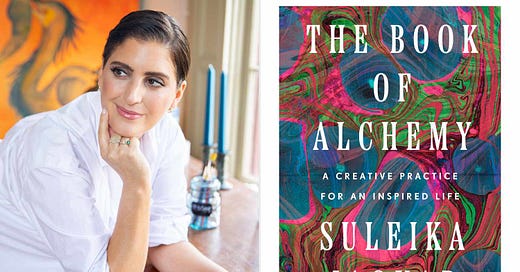Sulieka Jaouad was very sick as a 22-year-old and what drove her out of her near complete despair was something created by a Yale professor called the 100-day project, in which she would “perform one creative act daily for one hundred days—a sketch, a poem, a photograph, whatever medium calls to you.”
In her new book, The Book of Alchemy: A Creative Practice for an Inspired Life, Jaouad placed her creative focus on journaling and writes:
“I began using my journal like a reporter’s pad, recording snippets of overheard nurses’ conversations or things I saw through my hospital window: tiny people in suits hustling to work; teenagers making out on benches; the trees in the park a burnished gold, then bare of leaves, then fanged with icicles. I kept rage diaries, where I vented against my situation, against my body and its betrayals, against the well-meaning exhortations from others to ‘stay positive’ and to ‘keep looking for the silver lining.’ I recorded my fever dreams. I doodled. I made lists. I explored things I couldn’t say out loud, that I hadn’t been able to admit to others or even to myself.”
She later turned those journal entries into a New York Times column all about being a young person with cancer … called Life, Interrupted. Eventually she got a bit tired of her own voice and began reading other people’s journals. “The experience was kaleidoscopic. A sentence, an idea, an anecdote could turn the barrel, refracting and reframing my perspective.”
So the book offers creativity ideas from 100 other authors and a “prompt” at the end of each designed to either get the creative juices flowing or to help them continue to flow. Jaouad suggests reading one a day for 100 days as a way of launching our own journaling or other creative endeavors.
I think she hits home the hardest for me—and why I write this blog or website or whatever you want to call it—in her description of journaling, and how it’s actually been a crucial part of our historical understanding, whether it was Ann Frank providing some of what we know about what it was like in the Holocaust or the scientific musings of Charles Darwin:
“The journal is capacious. It can be an aid to memory, a reliquary of major life events, a place to let off steam, rattle off lists of dos, don’ts, and dreams, or conjure something beautiful and wild and unexpected. It’s where we can go to cut through the noise, where we take stock and discover meaning, where we tap into the subconscious and our free-flowing stream of intuition. The journal is where we seek out and find our highest, most liberated, most creative self.”
Many if not most people, when confronted with the prospect of having to sit down and write something, are frozen in fear, or perhaps something else in line with fear. So the book begins with a series of essays about how to get past that and begin journaling.
“Here Goes Nothing” by Dani Shapiro imparts the wise words that, for writers, a day of writing—even if the writing is no good—is far better than a day in which writing has been avoided. “A day spent writing is a good day, always.” If you’re at a total loss on where to begin, you can try writing what you would write if you weren’t afraid. It doesn’t have to be something you post online or try to get published. You can totally shred it afterwards.
“Just Ten Images” by Ash Parsons Story is about how writing is the way she translates her life to herself. She reflects on 10 images from the last 24 hours and writes them out, noting that it’s easier for her—and maybe all of us—to find inspiration in what we’ve just recently witnessed rather than digging deep to find inspiration out of thin air.
“The Art of Dailiness” by Michael Beirut is about how, grieving after 9/11, he decided to draw a photo he would see in the newspaper every day. He never thought about sharing the drawings back in those pre-social media days. He was just doing it for himself. Later, teaching at Yale, he started assigning to his students on the first day of each class that they think of something creative that they can do for each of the next 100 days. Beirut is credited with having started the increasingly popular idea of 100 days of creativity.
“Be Slow” by Rachel Schwartzmann notes that, with all of our pinging reminders on our devices, we are very distracted. She suggests turning off everything for five minutes and staring at the wall or the sunlight coming in the window, then when that time is done, write about what you were thinking during those five minutes.
I’m not often at a loss of what to write about and typically have 50 or so stories in various states of completion. So I’m not sure how practical The Book of Alchemy will be for me. But I do love reading about the practice of writing and how people approach it, and journaling has been very helpful to me over the years in organizing my thoughts and generally thinking through life. I highly recommend that everyone do it, so, along those lines, this could be quite a helpful book.





